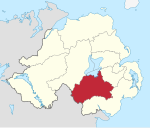Armagh City, Banbridge and Craigavon
Armagh City, Banbridge and Craigavon
| |
|---|---|
District | |
 | |
| Sovereign state | United Kingdom |
| Constituent country | Northern Ireland |
| Status | District |
| Incorporated | 1 April 2015 |
| Government | |
| • Type | District council |
| • Body | Armagh City, Banbridge and Craigavon Borough Council |
| Area | |
| • Total | 514 sq mi (1,332 km2) |
| Population (2021) | |
| • Total | 219,127 |
| • Rank | 2nd of 11 |
| • Density | 430/sq mi (160/km2) |
| Time zone | UTC0 (GMT) |
| • Summer (DST) | UTC+1 (BST) |
| Ethnicity | 96.7% White[1] |
| Website | https://www.armaghbanbridgecraigavon.gov.uk/ |
Armagh City, Banbridge and Craigavon is a local government district in Northern Ireland. The district was created as Armagh, Banbridge and Craigavon on 1 April 2015 by merging the City and District of Armagh, Banbridge District and most of the Borough of Craigavon. The word "City" was added to the name on 24 February 2016,[2] to reflect Armagh's city status. The local authority is Armagh City, Banbridge and Craigavon Borough Council.
Geography[edit]
The district covers parts of counties Armagh and Down, taking in the upper Bann valley and much of the southern shore of Lough Neagh as well as Armagh city. It has a population of 219,127.[3] The name of the new district was announced on 17 September 2008.[4]
Demographics[edit]
In the 2021 UK census, the district was 96.7% white.
The national identities of the new council from the 2011 census are:
- 50.5% British
- 28.9% Northern Irish
- 25.2% Irish
- 4.6% Other
- 1.3% English, Scottish, Welsh
The religious make up is as follows:
- 51.7% Protestant/Other Christian
- 43.0% Catholic
- 5.3% Other/None
Armagh City, Banbridge and Craigavon Borough Council[edit]
Armagh City, Banbridge and Craigavon Borough Council replaces Armagh City and District Council, Banbridge District Council and Craigavon Borough Council.
The first election for the new district council was originally due to take place in May 2009, but on April 25, 2008, Shaun Woodward, Secretary of State for Northern Ireland announced that the scheduled 2009 district council elections were to be postponed until 2011.[5] The first elections took place on 22 May 2014 and the council acted as a shadow authority until 1 April 2015.
See also[edit]
References[edit]
- ^ "Main statistics for Northern Ireland Statistical bulletin - Ethnic group" ONS. Retrieved 22 September 2022
- ^ "Change of District Name (Armagh, Banbridge and Craigavon) Order (Northern Ireland) 2016". Legislation.gov.uk. 18 January 2016. Retrieved 17 June 2016.
- ^ "Mid-Year Population Estimates, UK, June 2021". Office for National Statistics. 21 December 2022. Retrieved 18 October 2023.
- ^ "Provisional Recommendations of the Local Government Boundaries Commissioner for Northern Ireland". LGBC. Archived from the original on 20 September 2008. Retrieved 26 September 2008.
- ^ Northern Ireland elections are postponed, BBC News, April 25, 2008, accessed April 27, 2008
